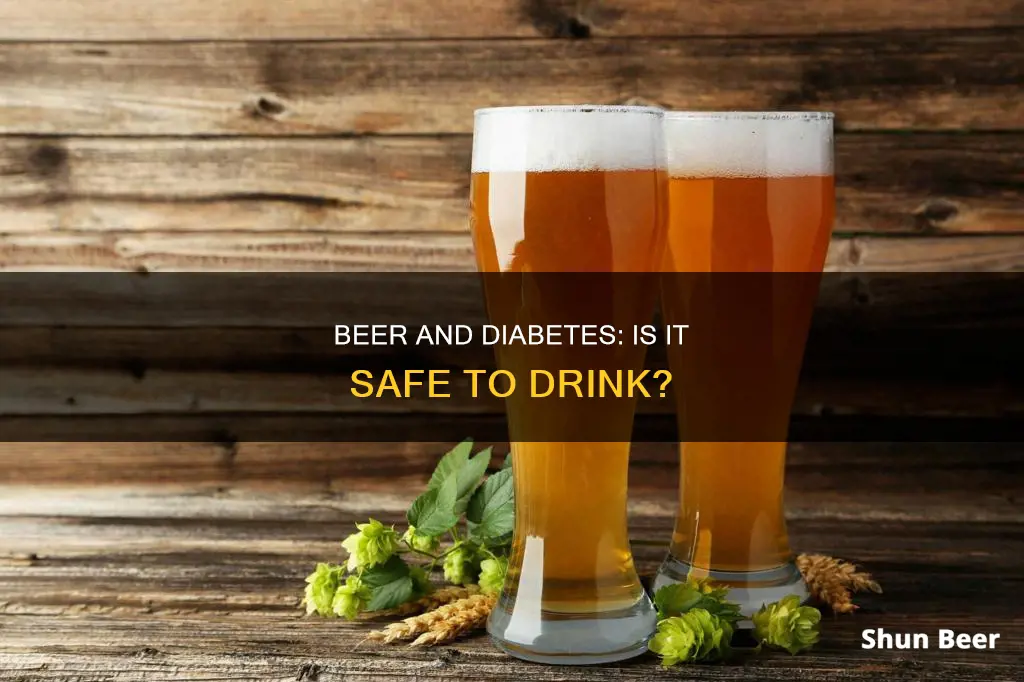
People with diabetes do not need to abstain from alcohol entirely, but they should be cautious when drinking. Alcohol can impact blood sugar levels, increase appetite, and reduce medication effectiveness. It is recommended that people with diabetes drink in moderation and only when their blood sugar levels are well-managed. The safest way to drink alcohol for people with diabetes is to consume it with food, especially carbohydrates, and to monitor blood sugar levels before, during, and after drinking.
| Characteristics | Values |
|---|---|
| Alcohol consumption recommendations for people with diabetes | No more than one drink a day for women and up to two drinks a day for men |
| "Binge drinking" | Drinking more than four drinks (for women) or five drinks (for men) within two hours |
| One serving of beer | 12 ounces |
| "Light" beers | Lowest in carbs, calories, and alcohol |
| Hoppy craft beers | Higher in carbs, calories, and alcohol |
| Safe drinking tips | Drink no more than one drink per hour, and no more than three or four drinks for the day; Drink plenty of water; Don't drink on an empty stomach; Keep an eye on your blood sugar |
| Alcohol's impact on blood sugar | Alcohol can cause blood glucose levels to rise or fall |
| Alcohol's impact on liver | Alcohol prevents the liver from doing its job of regulating blood sugar |
| Alcohol's impact on medication | Alcohol can interfere with the positive effects of oral diabetes medicines or insulin |
| Alcohol's impact on weight | Alcohol stimulates your appetite and may affect your judgment, which may cause you to overeat and disrupt your blood sugar control |
What You'll Learn

Beer is a source of carbohydrates and can impact blood sugar
The carbohydrates in beer can have a significant impact on blood sugar levels, especially for people with diabetes. When you drink beer, the carbohydrates are broken down and absorbed by the body, causing a rise in blood sugar levels. This effect can be particularly pronounced in people with diabetes, as their bodies may already have trouble regulating blood sugar.
Additionally, drinking beer can also slow down carb metabolism. This is because the liver, which is responsible for releasing glucose into the bloodstream and breaking down toxins like alcohol, prioritizes clearing alcohol from the body. As a result, drinking beer can lead to a delay in the release of necessary sugars into the bloodstream, potentially causing low blood sugar or hypoglycemia.
The impact of beer on blood sugar levels is further influenced by the presence of alcohol. Alcohol interferes with the liver's ability to release glucose, leading to a drop in blood sugar levels. This effect is particularly significant when drinking on an empty stomach, as the body does not have an alternate source of glucose.
Overall, while beer can be a source of carbohydrates and impact blood sugar levels, it is important for people with diabetes to understand the risks and take appropriate measures to monitor and manage their blood sugar when consuming beer.
Beer and Guaifenesin: Mixing Alcohol and Cough Medicine
You may want to see also

Alcohol may reduce the effectiveness of diabetes medication
The risk of hypoglycaemia is heightened for those taking diabetes medication, particularly insulin and sulfonylureas. Alcohol can interfere with the positive effects of oral diabetes medicines or insulin. It can keep the liver from turning proteins and fats into carbohydrates when the body needs energy, such as during exercise or between meals. This can lead to a drop in blood sugar levels if drinking alcohol on an empty stomach.
The risk of hypoglycaemia can be lowered if alcohol is consumed with food. It is recommended that those drinking alcohol also have a meal or snack containing carbohydrates. This will help to reduce the risk of blood sugar dropping too low. It is also important to monitor blood sugar levels before, during, and after drinking, as well as up to 24 hours after the last drink.
Beer and Blood Pressure: A Dangerous Mix?
You may want to see also

Drinking in moderation and when blood sugar is well-managed is advised
Drinking in moderation is generally considered safe for people with diabetes, but it's important to be mindful of how alcohol affects blood sugar levels and the risks involved. Firstly, it's crucial to understand that drinking guidelines for people with diabetes are the same as for the general population: no more than one drink per day for women and up to two drinks per day for men. These guidelines should be followed to ensure safe and responsible drinking.
When it comes to diabetes management, drinking in moderation and when blood sugar levels are well-managed is advised. This means that drinking excessively or binge drinking is strongly discouraged. Excessive alcohol consumption can lead to higher blood glucose and A1C levels, increasing the risk of chronic diseases such as heart disease, liver disease, and kidney disease. Therefore, it is recommended to limit alcohol intake to one to two 12-ounce beers per day for people with diabetes.
To avoid hypoglycemia, it is important not to drink on an empty stomach. Alcohol competes with the liver's ability to produce glucose, especially when blood sugar is already low. By drinking with a meal or a snack that includes carbohydrates, you can reduce the risk of hypoglycemia. It is also important to monitor blood sugar levels before, during, and after drinking, as alcohol can affect blood sugar levels for up to 24 hours after consumption.
Additionally, it is recommended to choose light beers or drinks with fewer carbohydrates, such as dry wines or seltzers, as they have a lower alcohol content and fewer calories. Avoiding drinks with sweet mixers or juices can also help manage blood sugar levels. Staying hydrated by drinking water along with beer is also advisable.
People with diabetes should be cautious and aware of the potential risks associated with drinking alcohol. It is always a good idea to consult a healthcare professional before consuming alcohol, as they can provide personalised advice and guidelines based on individual health concerns and medication use.
Beer and Meclizine: Safe Mix or Health Risk?
You may want to see also

Alcohol can cause hypoglycaemia or insulin shock
When you drink alcohol, your liver prioritises removing it from your bloodstream over releasing glucose. This can lead to hypoglycaemia, especially if you drink on an empty stomach. Alcohol also interferes with the liver's ability to produce glucose, so it's important to know your blood sugar levels before drinking.
Additionally, alcohol can interact with diabetes medications, particularly insulin and sulfonylureas, increasing the risk of hypoglycaemia. This is known as "insulin shock" and is a medical emergency. It is crucial to discuss alcohol consumption with your doctor if you are taking any medications for diabetes.
To minimise the risk of hypoglycaemia, it is recommended to drink alcohol only with food, especially carbohydrates. It is also important to monitor your blood sugar levels before, during, and after drinking. Knowing your limits and drinking slowly can also help prevent hypoglycaemia.
The symptoms of hypoglycaemia can be similar to those of intoxication, such as slurred speech, drowsiness, and confusion. Therefore, it is essential to be able to distinguish between the two. Wearing a medical alert bracelet or necklace can help others identify that your symptoms are due to low blood sugar rather than alcohol consumption.
Beer and Tequila: Mixing Alcohol Safely
You may want to see also

Drinking alcohol may lead to weight gain
Alcoholic drinks are often high in calories and provide little to no beneficial nutrients or minerals. Alcohol is also high in "empty calories", meaning it contains little to no beneficial nutrients or minerals. Alcoholic drinks are often high in empty calories, with about seven per gram. Cocktails and mixed drinks often have more calories than beer and wine. Liqueur, juice, and syrup add extra calories. For example, a piña colada has as many as 500 calories per seven-ounce serving.
Alcohol can also affect your hormones, increasing your appetite. Alcohol can impair the functions of your glands that release hormones, which may cause weight gain. For example, your adrenal glands secrete cortisol, a stress hormone that usually helps your body respond to stress by increasing blood pressure and heart rate. However, heavy drinking may cause your adrenal glands not to regulate how much cortisol they secrete, leading to high cortisol levels and increased abdominal weight gain. Cortisol also increases cravings for high-calorie foods.
Alcohol can also make you feel hungrier. After a few drinks, you may be more likely to make unhealthy food choices without thinking about it. Alcohol can reduce your blood sugar level, which may increase hunger. Some evidence suggests that people may seek high-carb foods to satisfy their cravings if their blood sugar dips slightly.
Alcohol also impacts the way your body burns fat. Your liver breaks down alcohol rather than fat while you are drinking. As a result, fat may accumulate in the abdominal region. Abdominal fat is linked to several health complications.
Forks, Flights, and Brews: A Beer-Drinker's Travel Guide
You may want to see also
Frequently asked questions
Yes, a person with diabetes can drink beer, but it is important to do so in moderation and only when their diabetes and blood sugar levels are well managed.
Alcohol consumption recommendations are the same for people with diabetes as for the general population: no more than one drink a day for women and up to two drinks a day for men.
Drinking beer can cause blood sugar levels to drop too low, a condition known as hypoglycemia. Beer can also be high in calories and carbohydrates, which can contribute to weight gain. Additionally, alcohol may reduce the effectiveness of diabetes medications.
It is important to drink in moderation and monitor blood sugar levels before, during, and after drinking. Drinking with food, especially carbohydrates, can help prevent blood sugar levels from dropping too low. It is also recommended to wear a medical alert bracelet or necklace that indicates the person has diabetes.







